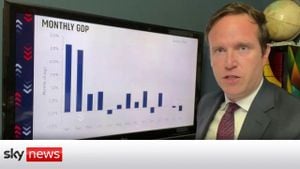ST. LOUIS — Fourteen North Korean nationals are now facing serious legal trouble, having been indicted for their involvement in a vast scheme to exploit American companies through identity theft, wire fraud, and money laundering. This multi-year con operation was allegedly orchestrated to help fund North Korea’s controversial missile programs.
The indictments were revealed at a press briefing held by the FBI office in St. Louis, which has been discreetly tracking the activities of these individuals. Ashley T. Johnson, leading the St. Louis FBI branch, disclosed the vast span of the operation, which reportedly generated upwards of $88 million for the North Korean government. "This is just the tip of the iceberg," Johnson stated, expressing concerns about the potential infiltration of other companies operating remotely.
The accused individuals purportedly worked for companies tied to the North Korean regime, particularly Yanbian Silverstar, based out of China, and Volasys Silverstar from Russia. Using false identities, they secured contracts as IT workers with U.S. firms, earning substantial salaries, which were funneled back to North Korea.
According to officials, many of these workers not only siphoned off their legitimate incomes but also resorted to stealing sensitive data from their employers. If U.S. companies refused demands for extortion payments, threats were made to leak proprietary information. Johnson noted some companies even suffered hundreds of thousands of dollars in damages due to this coercive strategy, effectively using data theft as leverage.
The scale of the operation was staggering. Over 14 accused individuals portrayed themselves as part of the American workforce — some adopting the identities of real individuals, others employing AI-generated profiles to navigate hiring procedures undetected. Federal investigators have asserted this sophisticated methodology involved deepfake technologies and the use of proxy servers, leaving employers vulnerable.
Among the indicted were figures such as Jong Song Hwa, Ri Kyong Sik, and Kim Ryu Song, whose names were cited as instrumental to the operation's execution. They generated mandates to collect at least $10,000 monthly, making their illicit earnings both systematic and financially beneficial to North Korea’s regime.
Johnson urged companies to heighten their scrutiny processes when it came to hiring remote workers, recommending regular video calls to confirm identities. "Insist on having workers appear on camera as much as possible if they are remote," she said, highlighting the need for companies to guard against this kind of infiltration.
Following past incidents, including previous indictments and warnings issued by federal agencies, it has become painfully evident how North Korea has shifted focus to involve more IT-related schemes under the directive of leader Kim Jong Un. These tactics have served not only to undermine U.S. financial interests but also contribute significantly to the advancements of North Korean military capabilities.
Recent reports have traced similar incidents back to 2021 when charges were raised against other North Korean operatives for their extensive global hacking efforts. The U.S. Justice Department has illustrated the regime's profit-driven motives, setting it apart from other nation-states like Russia and China, which often focus more on espionage and intellectual property theft.
One such notable case involved cybersecurity firm KnowBe4 earlier this year when they discovered a North Korean agent who bypassed their hiring procedures, manipulating systems to deploy malware shortly after beginning work. CEO Stu Sjouwerman drew attention to this vulnerability, marking it as representative of larger trends—not merely isolated incidents.
The federal investigation continues to evolve, and authorities are actively pursuing leads related to these workers and their domestic enablers. The U.S. Department of State is also stepping up to offer rewards, boasting as much as $5 million for information leading to the apprehension of any suspects.
Buried within this scheme lies the stark reality of how North Korea, through fraudulent practices, manages financial sustenance for its increasingly contentious military initiatives. This indictment stands not only as legal action but also as an urgent call to businesses to tighten their security and hiring measures.
For now, the future of these indicted individuals looks dire, as their legal battles loom large atop the broader narrative of North Korean aspirations and the international efforts to contain them.



